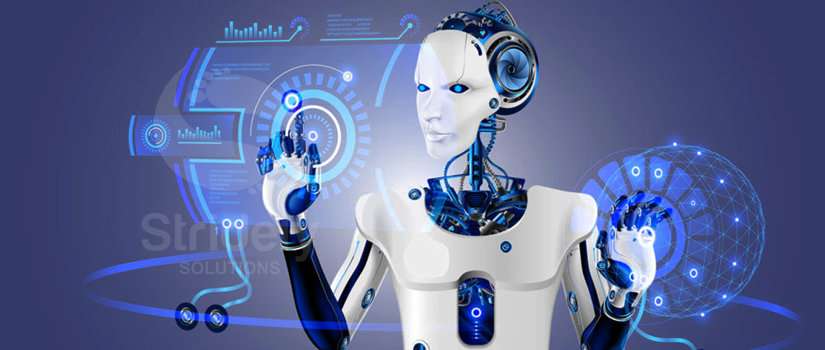Cutting-edge technologies, including AI, could immensely aid enterprises in disclosing engagement, productivity, and hardware collaboration with powerful and smart automation, RPA, and predictive ML. AI could be identified as the leading science of imitating human behavior.
ML is the substantial subset of AI, which helps train a machine to learn everything about it. Therefore, by combining ML with AI into the Robotic Process Automation (RPA), anyone can seamlessly perform smart and advanced automation of repetitive tasks and countless operations with layers of judgment, human perception, and prediction.
However, RPA has brought great benefits to enterprises. We have previously discussed RPA, and if you are wondering “what RPA is in simple terms,” this article contains all the answers. Furthermore, AI, ML, big data analytics are all on their way to usher an advanced era into the industry.
So, without further ado, let’s check out the best use cases of RPA, ML, and a few of RPA & ML.
Also Read: Entering the Decade of Automation – RPA for All
4 Best use cases of Robotic Process Automation (RPA)
Marketing: Lead Generation
Lead generation is an inevitable part of nowadays seamless marketing processes. The professional marketing team makes brand new entries for prospective leads within a CRM system amassed from outside sources. On the other hand, the majority of CRM platforms provide their self-built-in data upload tools.
Various legacy platforms are there, which need users to provide each brand new lead’s information. This is how shortening the time staff and enhancing the probability for error. With Robotics Process Automation (RPA), users can easily program the software to take the data from their spreadsheets.
Success Case: Automating Business-Critical Processes Via Next-Gen RPA Solutions
The employees of any enterprise can focus on getting associated with lead prospects rather than data entry to provide faster and accurate results.
Processing faster refunds
The reputation of any enterprise relies on how quickly it can solve the issues and refunds. Consumers call for this process to be faster, seamless, and pain-free! Hence, it is much more hassle-free.
Return requests and complaints produce much more data, which could be full of challenges while sorting through. RPA deal with those procedures and matters, which can refund without any significant delay. Therefore, ennobling customer satisfaction and possessing an optimistic impact on your brand’s reputation.
Payroll
It will be a time-consuming, hectic, and repetitive task to process payroll every month for a team in your organization. Hence, it includes a significant amount of data entry. Employee dissatisfaction stems from data inaccuracy in payment.
So, it would be necessary to consider the payroll use case. RPA crosschecks employee data consistency throughout numerous systems, loads earnings, verifying timesheets and tax deductions.
Also Read: RPA: A Blessing in Disguise for Accounting & Finance Industry
Here, virtual robots can administer taxable advantages, automate salary slips and other major paychecks. In brief, RPA automates payroll-oriented transactions to evade impreciseness, delays, and other hassles.
Price Comparison
Businesses need to make bulk purchases in order to provide top-notch services or manufacture quality products. Therefore, the price of such items has a profound impact on the enterprise’s revenue or profits. However, employees of any organization keep on researching online to offer knowledge-based and cost-cutting decisions.
Furthermore, researching is a complex and time-consuming process; that’s why we can observe it as diverse RPA use cases in various enterprises. So, it can be seen that chatbots make a thorough comparison of prices from diverse vendors by their high-rated product attributes. After that, businesses can purchase superior products at the most competitive rates.
Best 5 Use Cases of Machine Learning (ML)
Sales Optimization
Sales usually produce colossal unstructured data, usually utilized to give proper training to the ML algorithms. It could be a piece of fantastic news for the enterprises, which have been keeping customer data for several years.
The companies that are inclined to achieve a highly competitive edge are nowadays applying machine learning to both sales and marketing challenges to complete strategic objectives. Top-notch marketing strategies count on ML models, including ad placement, creative content, and predictive lead scoring.
That’s why by adopting ML in organizational activities, they can quickly grow and customize content to fulfill the ever-changing requirements for potential customers. Moreover, these models are using primarily for sales forecasting evaluation, consumer sentiment assessment, and customer churn conjecture.
Also Read: RPA is like the Band-aid Feature for the Future
Security
ML diligently helps organizations optimize their threat assessment and also how they can simultaneously respond to security concerns and attacks. According to the ABI research analysts, ML in data protection will enhance to $96 billion by 2021.
Furthermore, ML makes it hassle-free to analyze truckloads of data logs from IoT and mobile devices. So, it can produce variable profiles for behavioral patterns along with your IoT systems. However, the companies that accept a risk-aware characteristic are in a fantastic position to sustain a leading position in their industries.
Customer Service
Virtual digital assistants and chatbots are the new future of this era, ruling the world of customer service. Because of enormous customer interaction volumes, the colossal data are now being captured and assessed every day in order to fine-tune machine learning algorithms.
On the other hand, adopting ML in the company cloud could possess an impeccable impact on executing customer service-oriented routine tasks. However, as per the PWC report of 2017, approx 31% of the decision-makers of any company displayed the major impact of virtual personal assistants on solving the needs of their customers.
At the same time, 34% of executives reported that using chatbots was helpful for them to channel their contemplation towards profound creativity.
Process Automation
The Intelligent Process Automation (IPA) blends automation and AI. Hence, it showcases the distinct usage of ML. Such use cases list starting from automating manual data entry to more complicated automating insurance risk evaluations.
All thanks to its cognitive technology, such as machine vision, natural language processing, and deep learning. Here, machines can ameliorate conventional rule-oriented overtime and automation in order to adapt to the changes.
Also Read: Business Era: IoT, Bigdata and Machine Learning
Moreover, the enterprise benefits are much more than cost savings. Also, it includes superior usage of pricey equipment, quicker decisions, service, actions, and proficient employees. This is how ML in the enterprise liberates staff to focus more on service development and product innovation.
Collaboration
The leading criteria to adapting the maximum of the ML in the organization lies in the competencies of both human intelligence and ML.
Therefore, such premium collaboration tools possess much more potential to enhance effectiveness, fleet the new ideas’ discovery process, and optimize teams’ optimized consequences, who can collaborate from remote locations.
Some top-notch use cases in the collaboration space contain integration of chatbots, video, audio, image intelligence, and real-time language translation.
Also Read: Implementing IoT and AI for your Business – Beat your rivals Efficiently
Top 4 Use cases of both RPA and ML
Cybersecurity
Cybersecurity professionals have worked passionately and hard enough to respond to the continuously rising spectrum of security menaces as networks are gradually becoming highly complicated. It’s primarily complicated and challenging to impede hacking techniques. However, the evolution of IoT devices has amazingly transformed cybersecurity. This is how an enterprise can be susceptible to threats and malware.
Luckily, ML algorithms have triggered cybersecurity actions to sustain such quick developments. More precisely, predictive analysis has shown a lower number of hazards and quick detection than ever before. RPA and ML can now assess user activity amid a network to identify security issues, malware, and other threats.
Process Assessment
Process analysis has been performing quite often for decades by top-notch consultancies. Hence, it is the most amazing business-critical initiative have ever taken by anyone! Consultants prepared the process flow diagrams and interviewed several businessmen to assess and map their daily activities.
ML helps a lot to quickly evaluate process data in terms of system logs, user activities and identify repetitive structures. Hence, it mirrors the scopes for process automation and optimization. More importantly, the discovery bot is a top-notch example of an automating process assessment solution.
Fraud Identification
Today’s modern world is based on online financial transactions. Therefore, this has also loomed customer awareness of numerous fraud types. Customers appreciate the seamless online transaction facility. However, at the same time, they are worried about the safety norms. That’s why credit card enterprises harness ML algorithms to assess maximum volumes of transactional data to ascertain skeptical behavior.
Moreover, such kind of checking processes and following guidelines are not new; ML has drastically improved the function and scope, unbolting up to 95% of fraudulent activities and shortening investigation time by 70%. As per the example of RPA solutions benefitting fraud identification models manufactured with Google AutoML.
Claims verification and processing time for insurance industry
Continuous complaints have been coming forward from the insurance industry because of the time-consuming procedures during claim verification and processing time. Here RPA allows insurance organizations to crosscheck claims harnessing predefined regulations and reduce fraud claims.
On the other hand, in order to streamline claims processing time, RPA enhances the processing speed and enhances the customer experience. Previously, the manual processing claims demanded a plethora of time because of data extraction and adding data into those forms.
Concluding words
In a nutshell, today’s fast pace era calls for robotic process automation and machine learning. Whether it’s to minimize budgets or optimize your operational effectiveness, RPA has become a significant necessity for all types of enterprises and there are much more use cases to arrive. The breadth of use cases and major applications for RPA and ML will propagate in the upcoming years as the gradual advancement of technology will happen.
In this new beginning of the era, it becomes inevitable to utilize ML applications for saving budgets, optimizing productivity, and propelling enterprises towards development.
You may start small to ascertain if it is appropriate choice for an enterprise, and thereafter or automate your whole enterprise gradually. Stridely Solutions has a reliable team of RPA experts that could consult you and provide needed services as and when needed.


